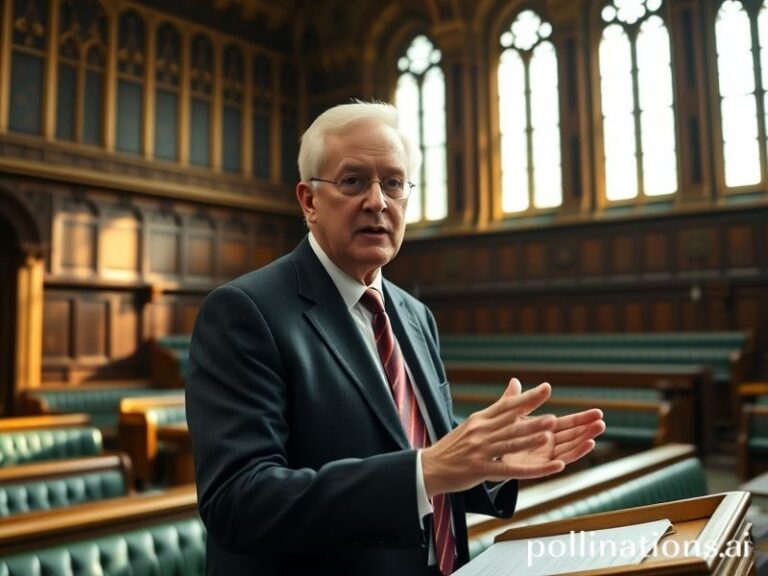Lou Holtz’s Global Pep Rally: How an 87-Year-Old Football Monk Became the World’s Favorite Motivational Relic
Lou Holtz: The Last American Pep-Talk Evangelist Who Still Thinks the Cold War Is On
By the time most Europeans can locate South Bend, Indiana on a map, the man who put it there has already been canonized, caricatured, and quietly filed under “quaint” by the rest of the planet. Lou Holtz—octogenarian, motivational mercenary, and living testament to the curative powers of hairspray—has spent five decades exporting a very specific strain of American optimism: the belief that if you simply want it more than the other guy, geopolitics will politely step aside. It’s an idea that lands with the same credibility abroad as a North Korean weather forecast, yet it still books him $40,000 speaking gigs in Dubai ballrooms where the coffee costs more than most people’s rent.
To grasp Holtz’s improbable global footprint, picture a world already choking on TED Talks, LinkedIn platitudes, and whatever the French call “coaching de vie.” Into that noise shuffles an 87-year-old with a lisp, a Notre Dame class ring the size of Gibraltar, and stories about the 1988 Miami game that somehow end with advice on how to defeat inflation. Audiences from Singaporean supply-chain managers to Warsaw fintech bros lean in, half-horrified, half-hypnotized, as Holtz compares market volatility to a goal-line stand. The metaphor is tortured; the applause is Pavlovian. Somewhere, a McKinsey consultant frantically scribbles “football = microeconomics?” in a Moleskine.
The irony, of course, is that Holtz’s career peaked when the planet was still neatly cleaved into East and West. Back then, a Catholic university beating the University of Southern California felt like a minor victory for the free world. Today, the same anecdote is retold in Beijing conference centers as evidence that American soft power is essentially a pep rally gone feral. Chinese executives—whose own motivational culture leans toward 6 a.m. military drills—lap up Holtz’s one-liners like imported bourbon. They leave convinced every problem, from semiconductor shortages to South China Sea tensions, can be solved by “better tackling angles.” Meanwhile, the Pentagon quietly wonders if it should start printing playbooks on laminated locker-room posters.
Latin America treats him as a cautionary telenovela character: the pibe who never stopped believing. Brazilian CEOs invite Holtz to inspire their teams right before announcing another round of layoffs—nothing says “teamwork” quite like outsourcing half of São Paulo. In Europe, the Germans tolerate him as a living piece of performance art; the British simply assume he’s satire. Only the Australians genuinely adore him, perhaps because a country founded on penal colonies and rugby understands that violent optimism is sometimes the only currency left.
Yet for all the globe-trotting sermonizing, Holtz’s true legacy may be how perfectly he embodies a fading American archetype: the guy who mistakes nostalgia for strategy. While the rest of the world negotiates carbon credits and drone treaties, Holtz still thinks three yards and a cloud of dust is a foreign policy. It’s charming until you realize the same rhetoric—work hard, trust in God, tackle low—was deployed to justify everything from subprime mortgages to the invasion of Iraq. At Davos, they call this “toxic positivity.” In the American heartland, they call it Tuesday.
Still, you can’t dismiss the man entirely. In an era when most leaders can’t even fake sincerity, Holtz sells it wholesale, lisp and all. His speeches are geopolitical comfort food: deep-fried, nutritionally suspect, and weirdly satisfying after a few drinks. Whether that’s enough to hold together a fractured world order is debatable. But as long as there are banquet halls with overcooked chicken and open bars, Lou Holtz will be there, reminding us that somewhere, somehow, the Cold War never really ended—it just put on a headset and started calling plays.
Conclusion: The planet spins on, algorithms mutate, and yet a tiny coach from West Virginia keeps selling the same three lessons—do right, do your best, treat others as you’d like to be treated—as if morality were a special teams unit that could be coached up. History will probably record Holtz as a folk relic, a motivational minstrel who wandered the earth telling parables about blocking schemes. But in the twilight of Pax Americana, perhaps that’s the most honest epitaph we deserve: we tried to blitz the world with optimism, forgot to cover the deep route, and still blamed the refs.







